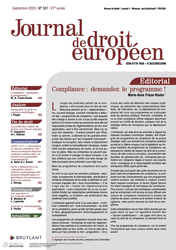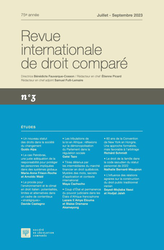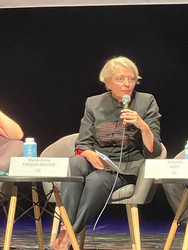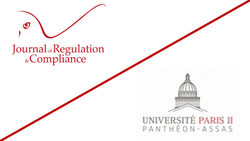Feb. 15, 2024
Publications

🌐follow Marie-Anne Frison-Roche on LinkedIn
🌐subscribe to the Newsletter MAFR Regulation, Compliance, Law
____
► Full Reference: M.-A. Frison-Roche, "Adjusting General Procedural Law to Compliance Law by the Nature of things", in M.-A. Frison-Roche (ed.), Compliance Jurisdictionalisation, Journal of Regulation & Compliance (JoRC) and Bruylant, "Compliance & Regulation" Serie, 2024, pp. 273-28.
____
📝read the article
____
🚧read the bilingual Working Paper which is the basis of this article, with additional developments, technical references and hyperlinks
____
📘read a general presentation of the book, Compliance Jurisdictionalisation, in which this article is published
____
The principal elements of this articles had been presented during the scientific manifestation held on September 23, 2021, at Dauphine University in Paris, coorganised by the Journal of Regulation & Compliance (JoRC) and the Institute Droit Dauphine.
In the book this article is placed in the chapter II about the General Procedural Law in the Compliance Law.
____
► Summary of the article (done by the Journal of regulation & Compliance - JoRC): General Procedural Law is an invention, essentially due to Professor Motulsky, going well beyond the gain that one always has in comparing types of procedures with each other. As he asserted, there is Natural Law in General Procedural Law, in that as soon as there is the Rule of Law Principle there cannot be, whatever the "procedure", even the "process", such and such way of doing things: for example, to decide, to seize the one who decides, to listen before deciding, to contest the one who has decided.
General Procedural Law therefore depends on the nature of things. However, Compliance Law organizes things in a new way. Therefore, both the simple and iron principles of General Procedural Law creep in where we do not expect them at first sight, because there is no judge, this character around whom ordinary procedures fit together. The principles of General Procedural Law are essential in companies. Even if the regulations do not breathe a word about it, it is up to the Judges, in particular the Supreme Courts, to recognize this nature of things because on this effect of nature that General Procedural Law is built: when compliance mechanisms oblige companies to strike, General Procedural law must oblige, even in the silence of the texts, to arm those who can be hit, even stand up against devices that would set aside too much these defenses that are easily considered contrary to efficiency (I).
But because it is a question of making room for this nature of the things of which the Rule of Law Principle entrusts the custody to the Judge and the Lawyer, the General Procedural Law must also adjust itself to what the extraordinary new branch of Law Compliance Law is. Indeed, Compliance Law is extraordinary in that it expresses the political pretention to act now so that the future will not be catastrophic, by detecting and preventing the realization of systemic risks, or even that it is better, by building effective equality or real concern for others. Because it is the Monumental Goals that defines this new branch of Law, a disputed systemic issue, possibly disputed by several parties before a judge, the procedural principles used by the court must be broadened considerably: they must then include civil society and the future (II).
General Procedural Law thus naturally acquires an even more place than in the classic branches of Law since on the one hand it imposes itself outside of trials, particularly in companies and on the other before the courts it involves people who had hardly any place to speak and thinks themselves, especially the systems entering the "causes" of Compliance now debated before the Judge.
________
Oct. 4, 2023
Conferences

🌐follow Marie-Anne Frison-Roche on LinkedIn
🌐subscribe to the Newsletter MAFR Regulation, Compliance, Law
____
 ► Full Reference: M.-A. Frison-Roche, "L'avenir du Droit de la compliance" (The futur of Compliance Law), in Cour de cassation (French Court of cassation), La Nuit du Droit 2023, October 4, 2023.
► Full Reference: M.-A. Frison-Roche, "L'avenir du Droit de la compliance" (The futur of Compliance Law), in Cour de cassation (French Court of cassation), La Nuit du Droit 2023, October 4, 2023.
____
🎥 Watch the video (in French)
____
🧮read the full programme of this event
The Cour de cassation (French Court of cassation) had presented 4 successive themes insofar as they affect the future of Law: filiation, artificial intelligence, the environment and compliance.
The President of the Chambre sociale de la Cour de cassation (Social Chamber of the Court of Cassation) gave a presentation on Compliance and the essential role played by the Judge. Then, the Parquet général (Prosecutor General's Office) then asked Fabien Raynaud, Conseiller d'État, about the importance of 'systemic cases' in Compliance Law and the dialogue between judges that it implies, using the Youporn case currently being examined by the judges.
____
► General presentation of the speech: As my work has been seminal for Compliance Law, I was asked about the future of Compliance Law.
________
Sept. 15, 2023
Publications

🌐follow Marie-Anne Frison-Roche on LinkedIn
🌐subscribe to the Newsletter MAFR Regulation, Compliance, Law
____
► Full Reference: M.-A. Frison-Roche, "Compliance : demandez le programme !" ("Compliance: ask for the programme!), J.D.E., 2023/7, No. 301, p. 349.
____
📝read the article (in French)
____
🌐see the LinkedIn post presenting this article
____
► Summary of the article: Compliance programmes are neither constraints imposed by a 'mad regulator' forcing companies to show in advance that they comply with all the regulations applicable to them, nor are they a delegation by the State of tasks it is incapable of accomplishing, such as eradicating corruption or stopping global warming.
On the contrary, they are a tool in the service of the alliance between public authorities and companies in the pursuit of the Monumental Goals of Compliance Law. Through them, the company implements actions to prevent the systemic risks associated with its activity. It thus assists the authorities in regulating new areas (digital, space) while adopting a sustainable strategy. As a result, it does not suffer from regulations, but participates in shaping the future. In this future, the judge plays a central role in shaping the compliance programmes that will be raised or challenged in 'systemic cases'.
________
Sept. 7, 2023
Publications

🌐follow Marie-Anne Frison-Roche on LinkedIn
🌐subscribe to the Newsletter MAFR Regulation, Compliance, Law
____
► Full Reference: M.-A. Frison-Roche & Arnoldo Wald, "Le cas Petrobras, une juste adéquation de la responsabilité pour protéger les personnes impliquées dans des systèmes globaux" ("The Petrobras case: the right balance of responsibility to protect those involved in global systems"), RIDC, July-September 2023, No. 3, pp. 563-582.
____
► Summary of the article: This article briefly outlines the main aspects of corporate liability in the capital market under Brazilian law, arising from the company’s duty to inform shareholders and investors, followed by a commentary on the recent partial award in an arbitration brought by minority shareholders against Petrobras, which underlines the legitimacy of the minority shareholders to engage the company’s liability.
________
July 8, 2023
Newsletter MAFR - Law, Compliance, Regulation

♾️suivre Marie-Anne Frison-Roche sur LinkedIn
♾️s'abonner à la Newsletter MAFR Regulation, Compliance, Law
____
► Référence complète : M.-A. Frison-Roche, "Présent et avenir des "causes systémiques" : cas des sites pornos (jugement 7 juillet 2023)", Newsletter MAFR Law, Compliance, Regulation, 8 juillet 2023.
____
📧Lire par abonnement gratuit d'autres news de la Newsletter MAFR - Law, Compliance, Regulation
____
🧱Consécration de la notion proposée de "cause systémique" dans les contentieux de Droit de la compliance : jugement du Tribunal judiciaire de Paris du 7 juillet 2023, "Youporn" (Arcom c/ Orange et autres)
Ce jugement remet de l'ordre et sursoit à statuer pour permettre au Conseil d'État de statuer sur ce qui est la même question impliquant le système numérique, les obligations des plateformes, la technologie. L'office du juge est en pleine transformation lorsque la Compliance est impliquée et que les systèmes eux-mêmes sont en jeu.
____
📧lire l'article ⤵️
June 19, 2023
Conferences

♾️ follow Marie-Anne Frison-Roche sur LinkedIn
♾️subscribe to the Newsletter MAFR Regulation, Compliance, Law
____
► Full Reference: M.-A. Frison-Roche, participation in the panel "Vigilance (due diligence)", in International Law Association (ILA), 150th Anniversary Symposium of the ILA/ADI, Paris, 19 June 2023.
____
🧮See the full programme of this event
________
June 13, 2023
Conferences

♾️ suivre Marie-Anne Frison-Roche sur LinkedIn
♾️s'abonner à la Newsletter MAFR Regulation, Compliance, Law
____
► Référence complète : M.-A. Frison-Roche, "L’obligation de compliance, entre volonté et consentement : obligation sur obligation vaut", in B. Deffains, M.-A. Frison-Roche et J.-B. Racine (dir.), Journal of Regulation & Compliance (JoRC) et Université Paris Panthéon-Assas, Compliance : Obligation, devoir, pouvoir, culture, Université Panthéon-Assas, Salle des Conseils, 13 juin 2023.
____
🎤consulter la présentation de l'autre conférence faite lors de la seconde journée de ce colloque : "Compliance et Droit processuel"
____
🧮Consulter le programme de cette manifestation
____
► Présentation de la conférence : Le Droit des contrats noue le "consentement" et la "volonté", puisque le consentement est ce qui manifeste la volonté d'une personne, en marque la liberté et l'engagement, en constitue la trace et la preuve. En 1995, j'ai montré que le Droit économique avait distingué le consentement et la volonté, pour rendre les consentements autonomes et en faire des marchés, notamment dans le Droit de la concurrence et le Droit financier📎
Puis en rendant hommage à Pierre Godé qui avait fait sa thèse sur la volonté📎
Mais la difficulté à comprendre le système général du Droit de la Compliance vient de la confusion souvent faite entre celui-ci et ce qui n'est qu'un de ses outils : la conformité. Or, la conformité est l'obligation pour un sujet de droit, certaines entreprises de donner à voir en Ex Ante qu'elles obéissent activement à la réglementation qui leur est applicable. J'ai montré en 2016📎
Les entreprise qui sont sujets du Droit de la Compliance ne sont alors pas toutes les entreprises, ni celles qui seraient "coupables" par avance, mais celles qui "sont en position" d'atteindre les buts : les "entreprises cruciales", notion que j'ai proposée en 2006📎
Il demeure que les entreprises, qui entrent dans le commerce juridique par leur personnalité juridique, peuvent elles-aussi exprimer leur volonté et non pas seulement consentir. Elles le font non seulement dans la mise en œuvre, ce que la Volonté du Législateur leur demande, mais encore en édictant des Buts, là où se loge la normativité du Droit de la Compliance.
C'est là où l'on doit affirmer dans un nouvel adage : Obligation sur Obligation vaut.
En effet, si l'entreprise exerce sa puissance juridique non seulement sa capacité à obéir (consentement), ce qui est une puissance faible, mais encore en exerçant leur puissance pour l'effectivité, l'efficacité et l'efficience des Buts Monumentaux du Droit de la Compliance, les systèmes et les êtres humains qui y sont impliquées en sont les bénéficiaires.
C'est pourquoi dans une conception générale du "pouvoir" que j'ai dessinée pour rendre hommage à Emmanuel Gaillard qui avait consacré sa thèse à cette notion📎
Le sujet premier devient alors en théorie et en pratique l'articulation entre la Volonté du Législateur (la "réglementation" applicable) et la Volonté des entreprises cruciales. Ce point sera particulièrement développé lors de la conférence.
La dimension probatoire de la question sera plutôt développée le lendemain dans la conférence qui, dans le cadre de ce cycle portant sur L'Obligation de Compliance, portera sur Compliance et Droit processuel.
_____________________________
La conférence est construite en trois temps :
III. OBLIGATION SUR OBLIGATION VAUT
________
M.-A. Frison-Roche, Remarques sur la distinction....
Mettre le titre et la fiche qui donne les références de la thèse
M.-A. Frison-Roche, Oui au principe de la volonté, Non aux consentements purs, 2018.
M.-A. Frison-Roche, Le Droit de la Compliance, 2016.
M.-A. Frison-Roche, Proposition pour une notion : "l'entreprise cruciale", 2006.
M.-A. Frison-Roche (dir.), Régulation, Supervision, Compliance, 2017.
M.-A. Frison-Roche, Concevoir le pouvoir, 2021.

April 25, 2023
Publications

🌐follow Marie-Anne Frison-Roche on LinkedIn
🌐subscribe to the Newsletter MAFR Regulation, Compliance, Law
____
 ► Full Reference: M.-A. Frison-Roche, The role of the Judge in the deployment of Regulatory Law through Compliance Law, Working Paper, April 2023.
► Full Reference: M.-A. Frison-Roche, The role of the Judge in the deployment of Regulatory Law through Compliance Law, Working Paper, April 2023.
____
🎤 This working paper was drawn up to serve as the basis for the concluding summary session of the colloquium organised by the Conseil d'Etat (French Administrative Supreme Court) and the Cour de cassation (French Judicial Supreme Court), De la régulation à la compliance: quel rôle pour le juge? ("From Regulation to Compliance: what role for the Judge?") held on 2 June 2023 at the Conseil d'Etat.
____
📝 This working paper also served as the basis for the article that concludes the book De la régulation à la compliance : quel rôle pour le juge, published by the La Documentation Française, 2024.
____
► Working Paper Summary: It is remarkable to note the unity of conception and practice between professionals who tend to work in administrative jurisdictions and professionals who tend to work in judicial jurisdictions: they all note, in similar terms, an essential movement: what Regulatory Law is, how it has been transformed into Compliance Law, and how in one and even more so in the other the Judge is at the centre of it. Judges, as well as regulators and European officials, explain this and use different examples to illustrate the profound transformation this has brought about for the law and for the companies responsible for increasing the systemic effectiveness of the rules through the practice and dissemination of a culture of compliance. The role of the judge participating in this Ex Ante transformation is renewed, whether he is a public law judge or a private law judge, in a greater unity of the legal system.
____
🔓read the Working Paper below⤵️

Updated: April 4, 2022 (Initial publication: Oct. 4, 2021)
Publications

🌐follow Marie-Anne Frison-Roche on LinkedIn
🌐subscribe to the Newsletter MAFR. Regulation, Compliance, Law
____
► Full Reference: M.-A. Frison-Roche, The Hypothesis of the category of Systemic Cases brought before the Judge, Working Paper, October 2021 and April 2022.
____
► This working paper has served as the basis for an introductory speech 🎤L'hypothèse de la catégorie des causes systémiques (The Hypothesis of the cateory of Systemic Cases), in a more general conference which I coordinated and moderated, 🧱L'office du juge et les causes systémiques, which is part of a general cycle covering Penser l'office du juge, specific conference attending the 9th May 2002 into the Grand Chamber of the Cour de cassation.
This Working Paper was drawn up in October 2021 to build the conference on the assumption that among the diversity of "cases" brought to the courts by litigants, some constitute a specific category: "systemic cases", justifying treatment that is both specific (in that they are systemic, calling in particular for procedural solutions common to all and distinguishable from the treatment of non-systemic cases) and common treatment beyond the diversity of judges who deal with them (judicial and administrative judges, criminal and non-criminal judges, French and non-French judges, judges of the member-States legal orders and European Union judges, etc.).
This working paper does not aim to deal with the whole subject, i.e. both to determine this category of "systemic causes" and the consequences that must be drawn from it for the judge's office, since that is the very purpose of the conference, which is built around several presentations: it aims to deal with the first part of the subject, i.e. the very existence of this new processual category, which is "systemic causes", leaving for other work the practical consequences to be drawn from it in the processual treatment that it calls for.
____
📝This Working Paper is also the basis of a forthcoming article
____
► Summary of the Working Paper: xx
________
Read below the developments⤵️

Nov. 6, 2020
Publications

► Référence complète : M.-A. Frison-Roche, L'attractivité économique de l'impartialité juridictionnelle, document de travail, nov. 2020
____
🎥 Dans un premier temps, ce document de travail a servi de base à une intervention dans la conférence-débat présidée par le président François Ancel avec Madame la Conseillère Carole Champalaune, "L'office du juge, les enjeux économiques et l'impartialité", dans le cycle de Table-Ronde que la Cour de cassation organise sur le thème général de Penser l'office du juge.
____
📝 Dans un second temps et postérieurement à cette conférence, il avait vocation à servir de base à un article publié dans un ouvrage collectif. Il semble que ce projet n'ait pas abouti.
____
Présentation générale. Pour s'insérer dans l'ambition du cycle général de colloques qui est de "Penser l'Office du Juge" et dans celui-ci qui appréhende l'impératif d'attractivité économique de celui-ci, le propos dégage tout d'abord le rapport qui paraît contradictoire entre celui-ci et la distance que le juge doit conserver. Ainsi il est souvent affirmé que le juge devrait être à ce point internalisé dans les "places", notion économique de grande portée (à laquelle est consacrée la première partie de l'introduction, définissant la "place" à la fois comme un espace close et poreux et comme un "justiciable systémique") qu'il devrait ipso facto perdre sa distance, c'est-à-dire son impartialité. Comme les places sont en concurrence, même si l'on met en balance l'efficacité de la place, d'une part, et l'impartialité, d'une part, d'un juge qui lui est extérieur et se réfère au Droit, l'Impartialité en ressortirait nécessairement affaiblie. Il faudrait alors au cas par cas amener le juge à faire les concessions voulues.
Le propos vise à prendre la position contraire et poser que les places - notamment parce qu'il faut les distinguer fortement des marchés, dont elles furent les ancêtres - requièrent un juge, qui sont à la fois "singulier", c'est-à-dire avec une personnalité, un visage, des opinions, et en distance pour que sa fantaisie ne surprenne pas les places. En effet, celles-ci requièrent une justice humaine, et non pas mécanique et le juge singulier, dont le juge des référés ou l'arbitre sont l'épigone, répond à ce besoin. Mais pour réduire ces "marges de discrétion", façon dont l'économie qualifie l'impartialité d'une personne qui ne peut jamais être neutre, la façon de faire de ce juge doit être insérée dans des mécanismes qui diminuent ces marges. De cette façon, la place a alors un juge qui est toujours plus impartial, et ce faisant devient toujours plus attractive.
Pour obtenir cela en pratique, la place exprime deux attentes légitimes en tant que "justiciable systémique", dont la satisfaction accroit et l'impartialité du juge singulier et accroit l'attractivité de la place comme espace. Ce qui montre bien qu'attractivité de la place et impartialité du juge, parce qu'inséré dans des procédures et dans une institution et une famille juridictionnelle, ne sont non seulement pas contradictoires, mais sont au contraire convergents, l'un alimentant l'autre.
Concrètement, et la pratique juridictionnelle le montre, il faut consolider l’impartialité du juge singulier en l’insérant dans des processus collectifs. Comme il faut favoriser un rayonnement de l’impartialité par un renforcement de la « famille juridictionnelle ».
Pour consolider l'impartialité du juge singulier en l'insérant dans des processus collectif, il faut admettre sans hésiter la subjectivité du juge, la rechercher même, le juge des référés ou l'arbitre étant bien les épigones du juge adéquat. La réduction des marges de discrétion, définition de l'impartialité étant obtenue par l'insertion du juge dans une procédure dont il est seul le maître mais dans laquelle il n'est pas seul. Cela a pour conséquence technique qu'il est lui-même dans un débat contradictoire, non seulement pendant l'instance, mais encore avant celle-ci (dans les médias), par le jugement (et l'arrêt de la Chambre criminelle du 25 novembre 2020 est un modèle du genre) et après le jugement. En cela le juge montre que par son office il est dans le futur, comme le montrera la justice climatique. En outre pour limiter ses marges de discrétion, le juge singulier doit s'insérer dans un principe rationnel de cohérence, vertical et horizontal. Vertical parce qu'il intègre ce qu'il est dit et la technique de "l'avis déterminant" est à encourager, le juge singulier ne devant s'y soustraire que s'il a de "fortes raisons" pour le faire et selon cette règle générale Comply or Explain (qui est le contraire même de l'obéissance aveugle). Horizontal parce que le juge soit se tenir à ce qu'il a dit, l'estoppel étant elle-aussi une règle de logique. Mais surtout l'institution doit dégager le plus possible des "doctrines", par tous les moyens, dont les rapports annuels sont un exemple.
Pour consolider l'impartialité du juge singulier en renforçant la "famille juridictionnelle", il convient d'en avoir une conception plus large, ce qui pourrait mener à des "lignes directrices" communes à des juridictions diverses, et plus forte, en intégrant ceux qui entourent le juge pour mener jusqu'au jugement. En cela la procédure devant la Cour de Justice de l'Union européenne, travail sur un dossier commun, est un modèle. Si cette communauté était plus forte encore, l'office du juge rendrait un plus grand service encore qu'il ne fait déjà dans l'espace numérique.
Ainsi, des juges toujours humains, toujours divers, toujours singuliers, qui écoutent, considèrent et ajustent à la situation, qui au sein d'une famille juridictionnelle s'insèrent dans une doctrine institutionnelle qui les dépassent et les portent mais qu'ils transforment s'il y a une forte raison, toujours dite, pour ce faire : voilà l'impartialité incarnée rend ant une place économique et financière attractive.
Introduction. Quand j'ai choisi de consacrer quelques années à élaborer une thèse sur Le principe du contradictoire, en procédure civile, pénale et administrative, l'on m'avait conseillé de prendre un sujet plus étroit et moins basique. Quand j'ai été agrégée, l'on m'a conseillé de "passer aux choses sérieuses", c'est-à-dire au droit des affaires, mais c'est par une chronique de Droit processuel financier que j'ai débuté. Car ce lien entre la façon dont les juges progressent dans la façon de comprendre le cas (procédure) et arrivent jusqu'au moment de décider (jugement) est si fort avec la vie économique, comme les fils de chaine et les fils de trame, qu'on aurait bien tort de dissocier. Pour ma part je ne peux dissocier la solution trouvée et la façon d'élaborer celle-ci. D'ailleurs si les juristes anglais sont si précieux en droit des affaires, c'est sans doute parce que le contentieux leur coule dans les veines, que les techniques probatoires leur sont enseignées avec soin, que pour eux le juge est toujours virtuellement présent, assis à la table des négociations contractuelles, simplement actualisé si vient le temps du contentieux. De la même façon que Carbonnier disait que l'Etat est en France présent dans l'élaboration de tout contrat. Pour ne prendre qu'un exemple récent, quand je regarde comme tous les badauds les rebondissements de la saga Facebook, je mesure la dépendance dans laquelle et la Commission Européenne et cette entreprise que l'on dit toute-puissance sont par rapport au Président du Tribunal de l'Union européenne qui appliqua dans son Ordonnance du 29 octobre 2020 le principe du due process , lequel est la forme processuelle du droit au respect des données personnelles, pour réorganiser tout le mécanisme d'obtention des courriels échangés à l'intérieur de cette entreprise.
Pourtant quand j'écoute les représentants des grandes entreprises, ils ne semblent guère apprécier le Droit, qu'ils appellent généralement "réglementation", et encore moins les juges, ce qu'ils font et comment ils le font, c'est-à-dire leur office, les deux étant liés si l'on pose que "le juge applique la réglementation". Pour en rester à la perception des entreprises et sans entrer dans le sujet lui-même du rapport entre l'office du juge face à la loi
Mais si cela était si vrai, les entreprises cesseraient de tant vanter le modèle anglais, qui est décrit comme une sorte d'idéal dans presque chaque article, alors qu'il est si onéreux, ou le système américain, qui est si complexe dans son articulation entre les niveaux étatiques et le niveau fédéral que tout juriste américain est avant tout un processualiste.
L'idée est alors différente. Il ne s'agit plus de reprocher à la justice son inadéquation mécanique mais plutôt le fait qu'elle ne s'ajusterait pas aux besoins (avec le coût - accepté - de cet ajustement) du monde économique. En effet, le Royaume-Uni et les Etats-Unis seraient certes des sociétés juridictionnelles mais dans lesquels le juge aurait l'attitude adéquate : s'effacer derrière la loi des parties afin de mieux la servir. Les entreprises reprochent alors aux juges français ou allemand de ne pas suivre, participant en cela à ce qui serait ce grave défaut de l'Etat qui substitue sa volonté à celle des parties.
A lire divers travaux, les entreprises voudraient que l'Etat et ses juridictions se mêlent le moins possible de ce que les parties ont décidé tout en leur fournissent leur puissance au titre de ce principe de "sécurité juridique" portée au plus haut. Cette neutralité du principe de "sécurité juridique" qui utilise la force du Droit en lui ôtant pourtant la parole, utilisant le Droit et le juge comme des porte-voix, pose que les parties intéressées, qui sont les plus à même de mesurer leurs besoins et de construire les mécanismes adéquats, fassent leur "petite loi", puisque c'est par cette expression-là que Carbonnier désignait le contrat.
Mais comme dans le monde concret, l'idéal de l'ajustement contractuel pur et parfait n'existait pas plus que n'existe la concurrence pure et parfaite, un agent doit intervenir d'une façon neutre pour servir la petite loi quand l'autorégulation ne fonctionne pas, par exemple lorsque l'ajustement des intérêts ne perdure plus dans le temps. Comme Robespierre voulait un juge "bouche de la Loi", il faudrait un juge dont l'office serait d'être la "bouche du Contrat". Le juge anglais se définit sans doute ainsi, associant étroitement Impartialité et non-immixtion dans le contrat. Un juge non intrusif, qui jamais ne décide mais toujours sert.
C'est bien cette grille de lecture que le professeur d'économie d'Harvard a utilisé pour élaborer le classement Doing Business, qui mesure l'attractivité du Droit et du Juge, c'est-à-dire son aptitude à permettre aux entreprises, grandes ou petites, de se développer. Guy Canivet dans l'ouvrage qu'il co-dirigea à ce propos
Pourtant, cela non plus ne doit pas être si vrai, et l'association entre Impartialité et non-immixtion dans la situation initiale soumise au juge ne doit pas être si exacte, quand on entend par ailleurs tant de compliments argumentés adressés au Conseil d'Etat dans son appréhension du contentieux économique, que la suggestion est faite par des entreprises de lui en transférer la totalité de la connaissance, par exemple en matière de régulation financière et bancaire. Il ne paraît pourtant pas un juge effacé.
Mais c'est peut-être à force de lire les travaux d'Analyse Economique du Droit qui sont construits sur cette conception-là, que l'on finit par les recopier et peut-être y adhérer, souhaiter un juge qui ne dise jamais non, un juge mécanique. D'ailleurs ce que l'on appelle l' "intelligence artificielle" promet cela. Dans une justice non-humaine, la machine assure que la décision est prise avec une automaticité qui garantit une absence de parti-pris. Qui n'a pas d'âme ne peut être corrompu, qui n'a pas de raison ne peut se tromper. Cette passion actuelle pour les algorithmes, reposant sur la confiance faite aux machines et la défiance faite aux êtres humains, qui demeure les juges, repose sur un idéal de justice infaillible. Mais là encore c'est une erreur que d'associer Impartialité et Infaillibilité
Cette neutralisation du juge par les machines est généralement approuvée par les travaux. Elle n'est pourtant que le dépend de la solution plus artisanale et sanctionnée pénale consistant à neutraliser le juge par la corruption ; c'est un système juridique bien attractif que celui dont on est directement propriétaire... Mais les études montrent l'inefficacité économique pour une place de la corruption. Même si l'on laisse de côté l'appréciation morale de la corruption, l'effet sur l'image, etc., même si l'on imagine des entreprises qui n'adhèrent pas à "L'amour des Loi" posée par Rousseau, qui ne distinguent pas entre leur intérêt et leurs obligations - ne suivant les obligations que si elles ont un intérêt à le faire, la volonté du juge ne jouant plus alors que dans le jeu des incitations, qui placent le Droit et le Juge, comme des éléments de l'environnement des entreprises, il a été montré que les entreprises ne souhaitent pas un système juridique corrompu. La Commission Européenne a notamment publié des rapports sur la contribution directe de l'Etat de Droit et de l'effectivité de juridictions impartiales sur le développement économique d'une zone.
L'on semble donc confronté à une double aporie, menant à ce qui serait une sorte de souhait de disparition : soit il faudrait que le juge soit absent (pour en finir avec ce qui a été décrit d'une façon critique comme la "société contentieuse"), soit il faudrait qu'il soit un serviteur docile et neutre de la loi du contrat.
Parce que cela n'est pas admissible, le choc en retour est très violent. En effet, face à ce qui serait la prétention, voire l'exigence, des entreprises face au Droit, aux Juridictions et aux juges pris les uns après les autres (le juge pénal étant peut-être le plus détesté de tous...), la réaction est celle d'une sorte de rejet en bloc de cette demande des entreprises d'un juge qui prend en considération les effets économiques de ses décisions !
L'on lit alors en symétrie des rapports qui affirment que le "Droit n'est pas une marchandise", que le juge n'est pas un distributeur automatique de ces nouveaux bonbons sucrés que seraient les jugements devant faire toujours plaisir, que la notion de "marché du Droit" qui déclenche tant d'écrits théoriques, doit être rejetée. Car le Droit étant une valeur, la valeur de justice, le juge ayant pour office de concrétiser dans les cas particuliers cette vertu-là, ces prémisses d'adéquation de son office à ce qu'en attendent les entreprises, serait en quelque sorte attentatoire à la "grandeur de la Justice", réduite à l'état d'étalage où l'on propose à l'encan les jugements frais du matin aux acheteurs de systèmes juridiques, foi de forum shopping.
Bataille rangée, dont nul ne peut sortir gagnant, car les jugements sont à la fois une prestation et une valeur, Guy Canivet ayant montré l'apport de l'impartialité du juge à l'économie du Droit
Les entreprises savent qu'elles ne peuvent pas anéantir, sous les formes précitées, le Droit et les juges. Mais elles ne veulent pas non plus en dépendre totalement. Elles demandent comme tout un chacun un "juge en distance", car c'est ainsi que l'on peut définir l'impartialité : un juge impartial n'est ni un juge passif ni un juge mécanisé ni un juge transparent par rapport à la situation qu'il appréhende, c'est un juge qui par méthode parvient à se placer "en distance" par rapport à lui-même et à la situation qu'il a pour office d'appréhender
Mais en quoi cette exigence est-elle particulière pour les entreprises, par rapport aux autres justiciables ?
Car elles n'ont pas plus de "droit à un tribunal impartial"
Dès lors une décision nouvelle n'a pas le même statut pour un justiciable et pour ce justiciable systémique que sont les places. Tous dépendent de la justice et de sa qualité, et il est exclu de dire que les entreprises, notamment les grandes, devraient avoir une justice de meilleure qualité, que le commun des mortels. Précisément, le critère n'est pas là. En effet un justiciable aura besoin d'un jugement une fois. Les jugements rendus par ailleurs, avant et après, par ce juge ne le concernent pas car il ne reviendra pas. pour un justiciable systémique, c'est davantage les jugements futurs qu'il prend en considération. Les entreprises doivent pouvoir anticiper ce que dira le juge demain.
Pour cela, le juge ne doit pas pouvoir juger comme il l'est. Cette mise en distance par rapport à son propre pouvoir permet à la place d'intégrer par avance les jugements futurs (bons ou mauvais, là n'est pas le sujet), puisque les places sont des espaces de calcul et de probabilité, notamment les places financières.
Ce qui est donc à exclure est le "pouvoir discrétionnaire". En effet, un pouvoir qui tient entièrement en son dépendance celui sur lequel sa décision va porter est qualifié en Droit de "pouvoir discrétionnaire". Le pouvoir discrétionnaire n'existe quasiment plus en Droit français et européen. Un pouvoir ne doit pas pouvoir "disposer comme il le veut" de ceux qui dépendent de lui, si légitime, si puissant et si indépendant soit-il par rapport à eux.
Comme l'on ne peut, et l'on ne doit, pas nier le pouvoir du juge (car si on le nie, il l'exerce alors de fait, mais sans contrôle et sans limite), la demande des entreprises vient du fait qu'elles vont venir et revenir devant le même juge, la même juridiction, le même ordre de juridiction, le même système juridictionnel. Ce qui est attractif pour elles, c'est de pouvoir penser sur le moment qu'elles seront traités de la même façon dans le moment suivant : cette permanence dans le temps, quel que soit l'être humain singulier qui juge, constitue la qualité d'impartialité du juge. En cela, l'impartialité du juge est l'inverse de l'amitié entre Montaigne et La Boétie, il n'y a aucun phénomène d'élection, sans qu'il y ait de crainte pour autant. L'impartialité du juge garantit à l'entreprise qui viendra demain devant le juge qu'elle ne sera pas surprise par la façon incohérente dont son cas sera jugé.
Cette impartialité objective singulière du juge est une qualité qui constitue un élément d'attractivité majeure pour les opérateurs économiques.
Theme which has given rise to a large number of works, particularly in comparative law. The article 12 of the Code de procédure civile expresses what is the judge's mission with regards to the situation.
Canivet, G., Frison-Roche, M.-A. et Klein, M., Mesurer l'efficacité l'efficacité économique du Droit, 2007.
The positive Law related to the "judge's mistake" is itself very instructive, because it is not possible to reproach to the judge a mistake, except if there is a procedure fault, that is precisely the criterium developed in this study for the definition of impartiality. About this question, see Frison-Roche, M.-A., L'erreur du juge, 2001.
Canivet, G., Economie de la Justice et procès équitable, 2001.
Frison-Roche, M.-A., L'impartialité du juge, 1999.
Frison-Roche, M.-A., Le droit à un tribunal impartial, 2012.